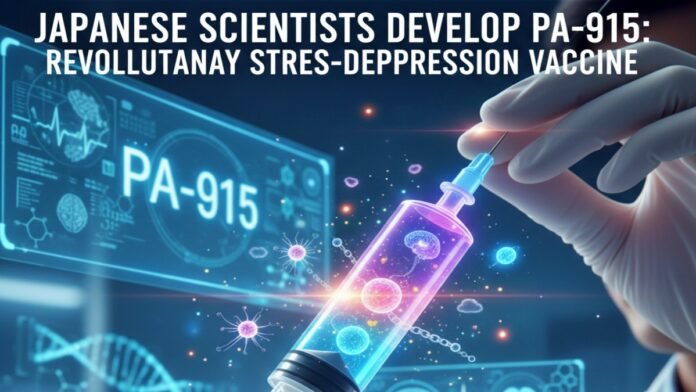
Key Points:
- Japanese researchers from Osaka University, Kobe University, and Hamamatsu University developed PA-915, an experimental non-peptide molecule targeting stress and depression
- Single dose showed antidepressant effects lasting 8 weeks in stressed mice, comparable to ketamine but without side effects
- Works by blocking PAC1 receptor (pituitary adenylate cyclase-activating polypeptide receptor), which regulates body’s stress response
- Over 280 million people worldwide suffer from depression and anxiety disorders, with approximately 4 million in India
- PA-915 improved anxiety-like behaviors, cognitive function, and depression-like symptoms in multiple chronic stress mouse models
- Unlike traditional antidepressants, PA-915 showed no signs of addiction, hyperlocomotion, cognitive dysfunction, or dependency in animal tests
- Study published in scientific journal Molecular Psychiatry in September 2025
- Human clinical trials expected to begin soon, offering hope for treatment-resistant patients
Osaka: In a groundbreaking development for mental health treatment, Japanese scientists have created an experimental vaccine-like molecule called PA-915 that demonstrates remarkable potential to treat stress and depression with effects lasting up to eight weeks from a single dose. This discovery, published in the prestigious journal Molecular Psychiatry in September 2025, comes at a critical time when mental health disorders affect an estimated 284 million people worldwide, creating an urgent need for more effective and safer treatment options.
Global Mental Health Crisis Demands New Solutions
Depression and anxiety disorders rank among the most prevalent mental health conditions globally, with the World Health Organization estimating that over 280 million people worldwide suffer from these debilitating conditions. In India alone, approximately 4 million people are affected by stress-related disorders. Depression is characterized by persistent sadness, loss of interest in daily activities, and chronic fatigue, while anxiety disorders manifest through excessive nervousness, fear, and worry, often without any apparent cause.
Current treatment strategies, including pharmacological medications and specific psychotherapies, present significant limitations. These existing treatments are not equally effective for all patients, and many antidepressants carry serious risks, including addiction potential, cognitive impairment, and various side effects that can severely impact quality of life. The WHO has emphasized the critical need for developing new and better solutions to address these shortcomings, making the development of PA-915 particularly timely and significant.
Revolutionary Mechanism: Targeting the PAC1 Receptor
PA-915 represents a fundamentally new approach to treating stress-related disorders. Developed through collaborative research by scientists from Osaka University, Kobe University Faculty of Medicine, Hamamatsu University Faculty of Medicine, and other Japanese research institutes, this small-molecule, non-peptide compound works through a highly specific biological mechanism.
The molecule functions as a high-affinity antagonist that blocks the PAC1 receptor (pituitary adenylate cyclase-activating polypeptide receptor) in the body. Accumulating scientific evidence suggests that activation of this receptor is directly involved in the stress axis and the development of stress-related disorders. By specifically blocking this receptor, PA-915 effectively regulates the body’s physiological stress response, thereby reducing both stress and depression levels without broadly affecting other brain systems.
Lead researchers Yusuke Shintani, Atsuko Hayata-Takano, and their colleagues emphasized that “stress-related disorders, such as depression and anxiety, are among the most important medical problems,” highlighting the significance of their research.
Comprehensive Animal Testing Demonstrates Efficacy
To evaluate PA-915’s effectiveness, scientists conducted rigorous testing using multiple chronic stress-induced mouse models that closely mimic human stress-related disorders. The research team subjected mice to three different stress paradigms designed to induce depression-like states: repeated social defeat stress (exposure to aggressive mice), repeated corticosterone administration (stress hormone injections), and social isolation rearing (prolonged isolation).
When stressed mice received a single dose of PA-915, researchers observed remarkably positive and encouraging results across multiple behavioral assessments:
Reduced Depression-Like Behavior: PA-915 significantly ameliorated the increased immobility time in the forced swim test across all three stress-induced mouse models, indicating reduced depressive behavior. In the sucrose preference test—a key measure of anhedonia (loss of pleasure)—mice showed restored interest in pleasurable activities.
Improved Anxiety Levels: Comprehensive evaluations using the light-dark box test, open field test, and elevated plus maze demonstrated that PA-915 significantly improved anxiety-like behaviors in stressed mice. The mice became notably more active and exploratory, behaviors that are typically suppressed under chronic stress conditions.
Enhanced Cognitive Function: Perhaps most remarkably, PA-915 reversed cognitive dysfunction caused by chronic stress, as measured by the Y-maze test and novel object recognition test. Stressed mice showed improved memory and better spatial navigation abilities after treatment, suggesting the molecule protects or restores cognitive processes damaged by prolonged stress exposure.
Eight-Week Duration: Comparable to Ketamine Without the Risks
One of the most significant findings was the duration of PA-915’s therapeutic effects. In direct comparative studies, researchers evaluated PA-915 against two established treatments: ketamine (a rapid-acting antidepressant that has gained attention in recent years) and fluoxetine (a traditional selective serotonin reuptake inhibitor).
The results demonstrated that in the sucrose preference test, an antidepressant-like effect was observed for a full 8 weeks following just a single dose of PA-915—a duration similar to that previously reported for ketamine. This extended therapeutic window represents a major advantage over traditional antidepressants, which typically require daily administration to maintain effectiveness.
Superior Safety Profile: No Addiction or Side Effects
The PA-915 vaccine’s most compelling advantage lies in its exceptional safety profile. Unlike many current antidepressants and particularly unlike ketamine, PA-915 did not induce any behavioral abnormalities in the test animals. Specifically, researchers found no evidence of:
Addiction or Dependency: Mice receiving PA-915 showed no signs of developing dependency on the molecule, a critical concern with many psychiatric medications, including benzodiazepines and, to some extent, ketamine.
Hyperlocomotion: Unlike stimulant-based treatments or ketamine, which can cause excessive, uncontrolled movement, PA-915 did not produce this concerning side effect.
Cognitive Impairment: Many psychiatric medications can negatively impact memory and cognitive function as side effects. PA-915 not only avoided causing cognitive damage but also improved cognitive performance in stressed animals.
No Effects on Non-Stressed Individuals: Critically, when PA-915 was administered to control mice that were not under stress, it did not cause any adverse effects or behavioral changes. This specificity suggests that the treatment selectively targets stress-related pathology without affecting normal brain function, making it a potentially safer alternative to current treatments that can cause side effects even in the absence of psychiatric symptoms.
Specific Therapeutic Benefits Across Multiple Dimensions
The comprehensive testing revealed that PA-915 provides benefits across multiple dimensions of stress-related psychopathology:
In mice subjected to repeated social defeat stress considered one of the most robust animal models of human depression—PA-915 demonstrated improvements in anxiety-like behaviors, depression-like behaviors, and cognitive dysfunction as assessed through a battery of seven different behavioral tests: light-dark test, open field test, elevated plus maze, sucrose preference test, forced swim test, Y-maze test, and novel object recognition test.
The treated mice exhibited increased activity levels compared to stressed, untreated mice. They showed better performance navigating complex mazes, demonstrating improved spatial learning and memory. Perhaps most importantly from a translational perspective, the mice showed restored interest in pleasurable stimuli (sucrose consumption) and reduced behavioral despair (decreased immobility in forced swim test)—both considered core symptoms analogous to human depression.
Path to Human Clinical Trials
The research team has announced that human clinical trials of PA-915 are expected to begin in the near future. If the positive results observed in animal models translate successfully to humans, this vaccine could represent a genuine game-changer in mental health treatment.
The molecule holds particular promise for several patient populations that are underserved by current treatments:
Treatment-Resistant Patients: Individuals who have not responded adequately to existing antidepressants could potentially benefit from PA-915’s novel mechanism of action.
Patients Concerned About Addiction: Those who cannot or will not use medications with addiction potential—such as benzodiazepines or ketamine—may find PA-915’s non-addictive profile particularly appealing.
Individuals Experiencing Cognitive Side Effects: Patients who have experienced memory problems or cognitive dulling from traditional antidepressants might benefit from a treatment that actually improves cognitive function.
Scientific Foundation and Future Implications
The researchers emphasized in their published study that “the present results show that PA-915 improves anxiety-like behaviors and cognitive impairment and exerts rapid and long-lasting antidepressant effects in chronic stress-induced mouse models of anxiety and depression, proposing a promising treatment option for stress-related disorders”.
The study’s publication in Molecular Psychiatry, a high-impact, peer-reviewed scientific journal, lends significant credibility to the findings. The research methodology was rigorous, employing multiple stress models, comprehensive behavioral assessments, and direct comparisons with established treatments.
As the scientific community awaits human trials with great anticipation, PA-915 represents not just an incremental improvement but potentially a paradigm shift in how we understand and treat stress-related psychiatric disorders. The molecule’s unique combination of rapid onset, long-lasting effects, and exceptional safety profile positions it as a potential breakthrough that could fundamentally transform mental health care in the coming years.





















































